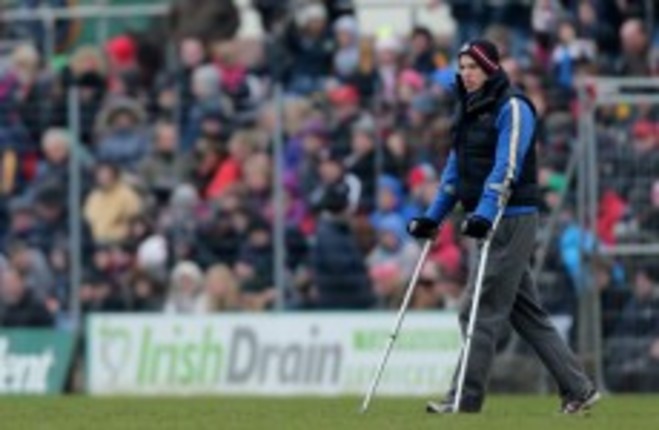1. Pop. When you tear or rupture the cruciate ligament in your knee, you hear a pop. It’s the first thing you’ll tell a Physio when they rush to your aid. I’d heard the pop twice by the time I was 23. Last month against Donegal I fell awkwardly. An innocuous fall, one that happens dozens of times in a game. I didn’t hear a pop but, deep down, I knew my fate. I’ve torn my cruciate. Again.
After damaging his cruciate ligament for the third time in his career, Cork forward Colm O’Neill recounts his struggle to shake the cruel injury on GAA Just Play.
2. Critics of the Boat Race are legion, and this is the one weekend of the year when they all emerge from the woodwork. They decry the event — not in such floridly pretentious terms, I grant — as an archaic obsolescence, an unsightly pimple of entrenched privilege on the egalitarian face of global sport, of not the remotest interest to anybody but the supercilious brats and leering alumni of those marvellous stone temples of irrelevance known for convenience as Oxford and Cambridge Universities. This, naturally, is stuff and nonsense.
It’s the one week of the year when people give a fiddler’s about the Oxford-Cambridge boat race. In the build up to this year’s renewal (won by Oxford), the Independent’s Jonathan Liew looked at why the tradition has improved so much as a spectacle.
3. After one collision too many that day Brian O’Driscoll lost his bearings, was clearly unsteady on his feet and had to be helped from the field, like a boxer assisted from the ring. You did not need experience in pathology to know that the great man was out of it for a moment in time. Yet a few minutes later he was back on the pitch, supposedly as bright as a button and fully recovered.
Dr Barry O’Driscoll, uncle of Brian and a former Irish rugby international, resigned his posts with the IRB last summer in protest at how the sport is “trivialising” concussion. The Scotsman’s Tom English meets one of the game’s most respected medics.
4. Brandon McCarthy has some ideas for how a profile of himself should read. He knows the formula cold: a quirky intro that sets the tone and lays out the big idea; background info on a life-altering event that shapes or cements a cogent personality trait; if you’re lucky, some fleeting trash talk that becomes the one thing in the piece everyone remembers, all leading up to a scene that ties everything up in a nice bow. Slumped on the living room couch in his downtown Dallas townhouse, he explains, as someone who likes to control his own narrative, that he’d prefer to go with a day-in-the-life structure. It could be based on yesterday, he says. The story would start out with him playing golf, sinking his fourth hole in one of the week, a little off his usual pace.
Arizona Diamondbacks’ pitcher Brandon McCarthy needed brain surgery after he was hit in the head by a line drive last autumn. While he’s recovering, he has plenty of time to sit around being funny as Buzzfeed’s Michael J. Mooney discovered.
5. Walsh has been writing about cycling since the late 1970s. Why did he not pursue the drugs issue in the years between then and the Armstrong era? Did it suit him to ignore the tough questions and to use the success of Stephen Roche and Sean Kelly so that he could further his own career as a journalist? Was he actually part of the problem for 20 years?
In the aftermath of the Armstrong affair, Irish cycling writer Cillian Kelly found himself fielding questions about David Walsh and why the journalist at the heart of the anti-doping battle didn’t act sooner.
6. There is a lot wrong about what Mike Rice did and how Rutgers has handled it. However, one of the most notable aspects the whole affair has brought up is just how toxic a locker-room culture can be when it is built upon harmful ideas about masculinity and toughness. In the video, Rice can be seen hurling both basketballs and abuse at his young players, often using homophobic slurs. The fact that he uses homophobic invective along with the physical abuse is no coincidence. He’s seen here trying to “toughen up” his players – he’s accusing them not of being gay, but being soft. The implication is that they need to take his abuse “like a man”.
In the Guardian, Hunter Felt tackles the story of Rutgers University and the toxic locker-room culture it allowed to develop around its men’s basketball team.
7. When John beckoned to the sideline that he could not continue, Rosaleen started crying. Áine was taken aback. Why cry, just because he was being substituted? “When have you ever seen John asking to be taken off before?” came the knowing response. From there, things moved very rapidly. Within days he was hooked up to a drip undergoing chemotherapy, a three-pronged tube pumping different medicines into his heart. John McGrath would miss yet another championship with Wicklow, but that was the least of his worries right now.
Finally, Daragh Ó Conchúir won a GAA McNamee Award this week for this brilliant piece on Wicklow footballer John McGrath and his battle against leukaemia.

